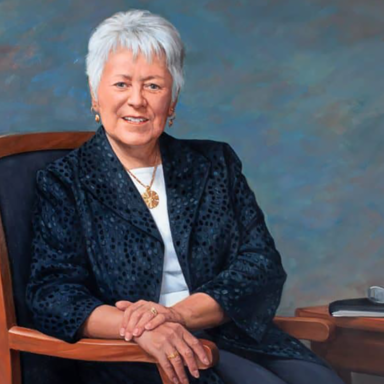 “I took to heart what he said, and what he said was, ‘I try and surround myself with the smartest and best possible people I can. Smarter than me because, in the end, not only will they make me look good and succeed themselves, but the institution will benefit.’”
“I took to heart what he said, and what he said was, ‘I try and surround myself with the smartest and best possible people I can. Smarter than me because, in the end, not only will they make me look good and succeed themselves, but the institution will benefit.’”
Key Points
- Not all paths to leadership are planned or expected
- Understand what experiences influenced your understanding of leadership
- Take risks based on your passions
- Leadership is isolated and less successful without collaboration
Non-Linear Path
Looking at the Data. Why is there still a plateau for women in leadership roles? In what fields are women represented at marginal numbers?
Historical Influence. What experiences have shaped where you are in your leadership today? Who do those experiences include? What laws, trends, etcetera, impacted the decisions that guided you to your current position? How does reflecting upon those experiences make you feel? Do those feelings guide your current decisions?
The “Right” People. Who were the people who supported your path into leadership? Who were the people who derailed you from your path into leadership? What have you learned from both of those experiences?
Know Your Story. How do you define leadership? Was your current leadership position always part of your plan? If yes, what do you think influenced your decisions? If not, how do you believe you came into your role? Is your priority to be successful or to help others to succeed? Dr. Mason discusses the need to continuously ask the questions “How do I make the institution better? How do I make the people at this institution the most successful they can be?” What is your guiding principle for success?
Lessons of Leadership
Mentorship. Who do you consider a professional mentor? What did you learn from him/her/them? What did he/she/they learn from you? What relationships did you find are the most important?
Opportunity. How do you respond when presented with a new opportunity? What is the last opportunity that you accepted? What is the last opportunity that you declined? What influenced your decisions around opportunity? Dr. Mason discusses cultural challenges around the meaning of succeeding and failing. What do you think about the phrase “failure is an option”?
Engagement and Service. How do you believe service is connected to leadership? What does it mean to purposefully engage with others? What skills have you developed to support others? Do you feel connected to the world around you? Dr. Mason defines her leadership style through servant leadership. What does the phrase “humbling yourself” mean to you? Can you think of a time when you were humbled in your profession? How did you initially respond? How do you think you would respond currently? Did you learn anything from the experience?
Collaboration and Partnership. How would you define collaboration? How would you define competition? Are you a natural collaborator or competitor? What makes collaboration important to leadership?
Other Resources
Greenleaf, R. K. (1970). The servant as leader. Newton Centre, MA: Robert K. Greenleaf Center.
Retrieved from https://www.leadershiparlington.org/pdf/TheServantasLeader.pdf
Madsen, S.R. (2007). Women university presidents: Career paths and educational backgrounds. Academic Leadership: The Online Journal 5(1). Retrieved from http://works.bepress.com/susan_madsen/13
